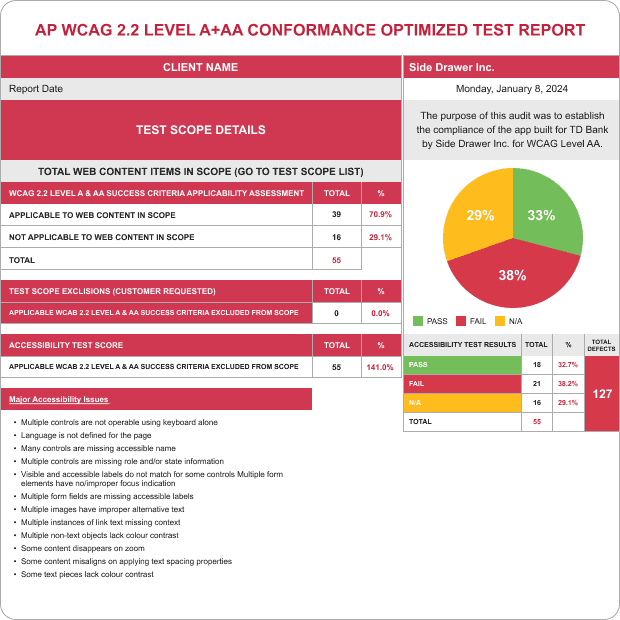Web Accessibility Compliance Management
Canada is evolving its accessibility legislation to appropriately meet the needs of the more than 6.2 million Canadians with some form of disability, a number that is growing with our aging population. Ontario’s mandate is to be global leaders in accessibility. One of the earliest laws establishing accessibility standards was the Accessibility for Ontarians with Disabilities Act, 2005 (AODA). The federal Accessible Canada Act, 2019 (ACA) and legislation moving forward in other provinces seeks to establish similar standards, including web accessibility standards, in order to produce a barrier-free Canada.
These acts make explicit the accommodations that people with disabilities can expect from governments and businesses, however people with disabilities have been entitled to accommodation since disability was established as protected grounds under human rights legislation like the Ontario Human Rights Code and Canada’s Charter of Rights and Freedoms. Accessibility legislation establishes an obligation for an organization to proactively address accessibility needs and incorporate the reduction and removal of barriers into their design processes.

Web Accessibility Compliance Management
Accessibility Partners Canada is a leader in ensuring compliance management with AODA, ACA, and accessibility best practices for websites, documents, and designing communications.

AODA
The AODA mandates the accessibility of websites, documents, communications, employment standards, customer service, transportation, built environment, and the delivery of goods and services. These mandates require that governments and businesses meet established best practices for accessibility, with significant penalties for failure to appropriately accommodate people with disabilities.
The AODA was enacted in 2005, and was the first legislation of its kind in Canada that included specific provisions establishing standards for accessibility and penalties for failure to comply. The law requires that all organizations, both public and private, be accessible to persons with disabilities by 2025. These requirements specify that online content created in 2012 or later must meet accessibility standards such as the WCAG guidelines.

WCAG
Web Content Accessibility Guidelines (WCAG) are a set of technical specifications that make online content accessible to people with disabilities. These guidelines encompass content design and delivery, as well as interoperability with assistive technologies. WCAG guidelines are not regulations, however, as a set of internationally accepted best practices, compliance with WCAG guidelines is a common component of accessibility legislation and mandated by Integrated Accessibility Standards and Regulations, Section 14 in Ontario.
The AODA contains specific provisions requiring compliance with WCAG 2.0 AA. As newer iterations of the guidelines are implemented, however, they supersede the earlier guidelines and become the new standard. WCAG 2.1 guidelines are the current best practices, and WCAG 2.2 standards are expected to be released in early 2023. Keeping up to date with best practices helps you serve your clients better, and protects your organization from complaints under the AODA.

ACA

ADA, Section 508, and EN 301 549
Taking a global approach to accessibility ensures that you’re prepared to take advantage of opportunities no matter where they appear. Compliance with the Americans with Disabilities Act (ADA) and General Services Administration regulations Section 508 will allow you to do business in the United States and with the US Government. Compliance with European standards EN 301 549 will ease the process of bidding on EU and Canadian contracts.
